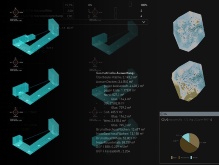Multi-objective optimization and machine learning for climate-friendly building design
Development and practical evaluation of algorithms and tools
The integration of data-based processes and methods into the design of buildings enables emission-related environmental impacts and the consumption of finite resources to be reduced to a minimum throughout all phases of a building's life. Especially multi-objective optimization (MO) can support building designers in designing climate-friendly buildings. In combination with parametric modeling and building simulations, MO allows the automatic search for design solutions that satisfy different criteria, as well as the trade-off between conflicting criteria, such as construction costs and energy efficiency. The use of MO is particularly promising in early design phases, since decisions made, e.g. on building geometry or building materials, have the greatest influence on grey and operational (CO2) emissions.
The project presented here develops and tests novel algorithms of data-based artificial intelligence, develops software tools based on these algorithms, and demonstrates the application of these tools on realistic building designs of Ed. Züblin AG. Specialist planners from the general contractor are evaluating the usability and effectiveness of these tools. This applied research, which is very rare in the field of building optimization, is intended to advance the practical application of the developed algorithms and tools in building design practice and thus contribute to achieving the reduction of CO2 emissions from buildings specified in the Climate Protection Plan 2050.
PROJECT TEAM
ICD Institute for Computational Design and Construction, Chair for Computing in Architecture, University of Stuttgart
Anni Dai, Max Zorn, Tenure-Track Prof. T. Wortmann
Generative Design, Ed. Züblin AG
Zifeng Guo, Jacob Wegerer, Fabian Evers
PROJECT FUNDING
BBSR - Bundesinstitut für Bau- Stadt- und Raumforschung im Bundesamt für Bauwesen und Raumordnung - Innovationsprogramm Zukunft Bau
RELATED PUBLICATIONS
Wortmann, T., Fischer, T., 2020. Does Architectural Design Optimization Require Multiple Objectives? A critical analysis, in: Proceedings of the 25nd CAADRIA Conference. Presented at the CAADRIA 2020, CAADRIA, Bangkok, TH.
Wortmann, T., Natanian, J., 2020. Multi-objective Optimization for Zero-Energy Urban Design in China: A Benchmark, in: Proceedings of the Symposium on Simulation for Architecture & Urban Design. Presented at the SimAUD 2020, SCS, Vienna, AU, pp. 203–210.
Zorn, M., Catunda, N., Claus, L., Kobylinska, N., Frey, M., Wortmann, T., 2022. Replacing Energy Simulations with Surrogate Models for Design Space Exploration. Bauphysik 44.


